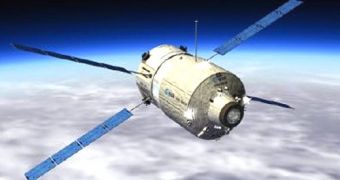Once the first flight of the Automated Transfer Vehicle (ATV) Jules Verne completed flawlessly, the European Space Agency (ESA) decided to ramp up production on these unmanned spacecrafts. Their primary goal is to deliver cargo, safe and sound, to the International Space Station. They are a part of the international service fleet that does this, which included the Russian Soyuz and Progress capsules, and the Japanese H-II Transfer Vehicle (HTV). Now, with the second ATV, Johannes Kepler, scheduled for launch later this year, ESA announces the naming of the third cargo capsule.
Officials at the agency decided to name it Edoardo Amaldi, in honor of the famed Italian physicist and space pioneer. “Italy is a key European country in our participation in the ISS partnership. By naming ATV-3 after Edoardo Amaldi, we celebrate a great Italian, but also a committed European who understood the importance of pooling resources and minds together to achieve important results,” said recently in a press conference the ESA Director for Human Spaceflight, Simonetta Di Pippo. Italian Minister of Education, University and Research Sottosegretario Pizza, and the president of the ASI space agency, Enrico Saggese, also participated at the meeting with the media.
“We are paying tribute to a visionary mind, to a great scientist but also to an idea of cooperation that is embodied in the ISS partnership. The ATV is the first recurring production of an exploration spacecraft and places Europe a step closer to our partners. I am glad that Italy is taking so much pride in their participation in the ISS, which is a recognition of their human and industrial capabilities,” the ESA official added, saying that the ATV is currently an indispensable part of the ISS logistics and resupply effort. Over the coming years, as the American space shuttles are retired, its importance will grow even more, as will that of all other unmanned cargo spacecrafts.
“Amaldi was one of the few that in the post-war years prompted into action starting a process leading to the founding of ESRO, and in following of ESA. It is widely acknowledged that since the 1950s the inception of the visionary concept aiming to a unified European capability to explore outer space is largely due to a bunch of prominent European scientists, and Edoardo Amaldi was a leading name among them,” Saggese says.

 14 DAY TRIAL //
14 DAY TRIAL //